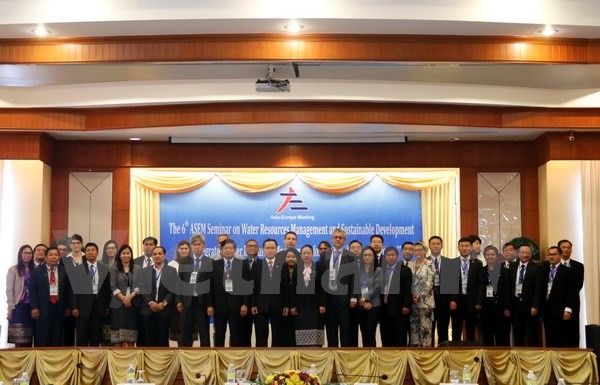Vietnamese Ambassador to Laos Nguyễn Bá Hùng yesterday called on the Asia-Europe Meeting (ASEM) to take actions to implement the 2030 Agenda for Sustainable Development.

Speaking at the sixth ASEM Seminar on Water Resources Management and Sustainable Development, themed “Integrated water resources management for sustainable development,” in Champasak Province, Laos, yesterday, he also called for action to carry out the 21st Conference of the Parties to the UN Framework Convention on Climate Change (COP 21) and the Sendai Framework for Disaster Risk Reduction.
A new holistic and interdisciplinary approach to water resources management is needed, integrating water management into each country’s sustainable development strategy and ASEM co-operation, he said.
It is necessary to promote practical co-operation between Mekong-Danube regions and to strengthen the global partnerships, said Hùng.
Hùng affirmed that Việt Nam respects and contributes to international and regional co-operation mechanisms on sustainable water resources management.
With the support of the United Nations, the Asian Development Bank (ADB), the World Bank (WB) and development partners, Việt Nam and other Mekong countries have implemented co-operative programmes in Mekong framework, contributing to building an ASEAN of "one vision, one identity, one community", Hùng said.
Việt Nam shares the desires of other Mekong countries to extend ties with the European Union and Danube region through dialogue mechanisms, initiatives and co-operation projects, he said.
Addressing the event, Lao Deputy Minister of Natural Resources and Environment, Bounkham Vorachith, said that in a globalised world, the impact of climate change, industrialisation, urbanisation and socioeconomic consequences of the global financial crisis have made the world more exposed to non-traditional security issues, particularly those related to water protection, precipitating the need to promote regional, inter-regional and global co-operation.
The Lao government committed to implement the development and consistent management of water resources in Laos and continued co-operation within ASEM framework, he said.
The deputy minister also hoped that this dialogue would not only allow the parties to discuss experiences in sustainable water management but also to create a basis for relations between the two continents in water issues.
During the two day-seminar, participants will discuss current water management issues at national and regional levels in Europe and Asia, impacts and solutions for the development of the water issues among ASEM countries and other countries as well as water co-operation between European and Asian countries to raise awareness to identify policies to support water management.
The discussions at this dialogue and many of the initiatives to be launched in the future will be an important preparatory step for the upcoming 13th ASEM Foreign Ministers’ Meeting in Naypyitaw (Myanmar) and the ASEM Summit in Brussels in 2018.
At the 11th ASEM Summit in Ulan Bator, Mongolia, in July 2016, Asian and European leaders prioritised cross-border water resources management co-operation. They agreed to strengthen Mekong-Danube co-operation to turn challenges to water, food and energy security into opportunities for inclusive growth and sustainable development. - VNS